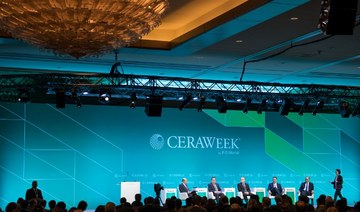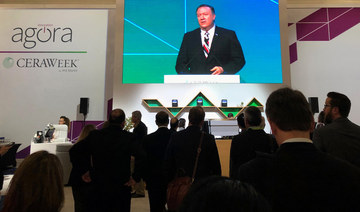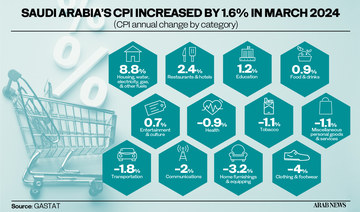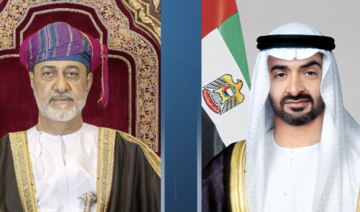HOUSTON: US oil industry leaders are concerned by the potential damage that could be done to their businesses if the Trump administration passes the so-called NOPEC act, opening up oil producers to legal action in the US.
A representative of the American Petroleum Institute (API), the trade organization for the US oil and gas industry, wrote: “The act’s extraterritorial overreach would harm core US economic and energy interests.”
The possible legislation under the No Oil Producing and Exporting Cartels Act was the subject of intense discussion at the CERAWeek by IHS Markit conference in Houston, Texas, where the Organization of the Oil Exporting Countries (OPEC) lobbied US financiers against it.
“NOPEC legislation won’t serve the US interest,” Mohammed Barkindo, OPEC’s secretary-general, told Wall Street bankers at the event.
The bill, currently before Congress, is backed by an alliance of Democrats and Republicans, and some US analysts believe it has a chance of passing. However, similar laws have previously been blocked by the threat of a presidential veto.
“There is no guarantee (US President Donald) Trump would veto it. He has shown himself to be against OPEC in numerous tweeted messages, and is critical of OPEC policy of maintaining stable oil prices,” said one Washington-based energy lobbyist, who asked not to be identified.
There was virtual unanimity in Houston among industry representatives that NOPEC would threaten the booming US oil industry.
In an article published to coincide with the CERAWeek gathering, the API’s Jessica Lutz said: “This legislation would only create significant detrimental exposure to US diplomatic, military and business interests — and, ultimately, consumer economic interests — while having limited impact on the market concerns driving the legislation to begin with.”
Other oil professionals also took aim at the bill. Dan Eberhart, CEO of independent oil services group Canary, said the law would seriously damage US and global oil. “OPEC’s moderating role has allowed the US oil sector to achieve record oil production, and has made America a major energy exporter — something that seemed impossible less than a decade ago.
“Saudi Arabia remains the world’s only real swing producer — capable of adding or subtracting several hundred thousand barrels a day of production in a matter of weeks. With its hand on the taps, Saudi Arabia has considerable power over oil prices — even while the United States has surpassed it as the world’s largest producer thanks to the shale boom,” he added.
Apart from his anti-OPEC tweets, Trump has not given any firm indication of how he would react if the bill passed Congress.
But other American policymakers oppose it. Rick Perry, the energy secretary, said before the CERAWeek forum opened: “We need to be really careful before we pass legislation that may have an impact that goes way past its intended consequence.
“I’m for a stable pricing, which is directly related to supply. If you remove that and there is no coordination of supply to the market you could have a massive amount of energy supply come into the marketplace and impact producers.”
On the final day of CERAWeek, John Cornyn, Republican senator for Texas and a political ally of the president, said that he did not think it was a good thing to use lawsuits in business, and instead, US oil producers should prove their merit by competing with OPEC.
One Houston-based financier, who also asked not be named, said: “If OPEC producers were open to lawsuits in the US under anti-trust legislation it could lead to the breakup of the organization. Without OPEC supply agreements the market could be flooded with oil and the price would crash. That would be no good for the shale industry.”
American oil leaders say no to NOPEC
American oil leaders say no to NOPEC
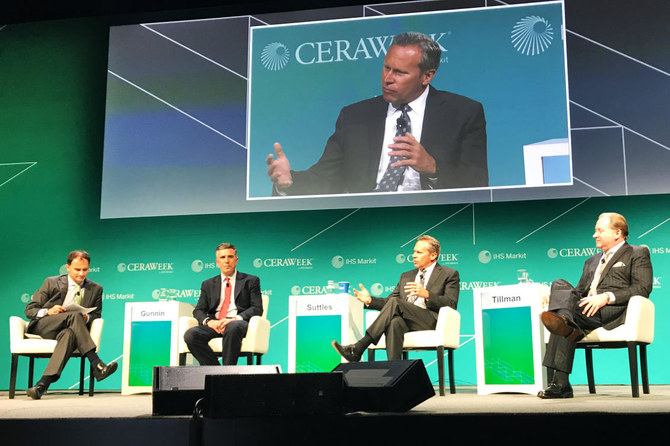
- The possible legislation under the act was subject of frenzied discussion at CERAWeek
- Virtual unanimity in Houston among industry representatives that NOPEC would threaten booming US oil industry
Oil Updates – prices climb amid US stocks decline, Middle East conflict

TOKYO: Oil prices extended gains on Wednesday after industry data showed a surprise drop in US crude stocks last week, a positive sign for demand, though markets were also keeping a close eye on hostilities in the Middle East, according to Reuters
Brent crude futures rose 26 cents, or 0.29 percent, to $88.68 a barrel and US West Texas Intermediate crude futures climbed 26 cents, or 0.31 percent, to $83.62 a barrel at 9:34 a.m. Saudi time.
US crude inventories fell 3.237 million barrels in the week ended April 19, according to market sources citing American Petroleum Institute figures. In contrast, six analysts polled by Reuters had expected a rise of 800,000 barrels.
Traders will be watching for the official US data on oil and product stockpiles due at 5:30 p.m. Saudi time for confirmation of the big drawdown.
US business activity cooled in April to a four-month low, with S&P Global saying on Tuesday that its flash Composite PMI Output Index, which tracks the manufacturing and services sectors, fell to 50.9 this month from 52.1 in March.
“This could help convince policy makers that rate cuts are required to support the economy,” ANZ analysts said in a note.
US interest rate cuts could bolster economic growth and, in turn, demand for oil from the world’s top consumer of the fuel.
Analysts were still bullish that any latest developments in conflicts in the Middle East will still support markets, though the impact on oil supplies remains limited for now.
“Overall, crude oil prices are well supported around current levels by on-going Middle East risk premium. On the topside, risk of possible renewed OPEC production increase from Jun will help limit any significant upside,” said head of markets strategy for United Overseas Bank in Singapore Heng Koon How.
“We maintain our forecast for Brent to consolidate at USD 90/bbl by end of this year,” Heng added.
Israeli strikes intensified across Gaza on Tuesday, in some of the heaviest shelling in weeks.
“Recent reports suggest that both Iran and Israel consider the current operations concluded against one another, with no follow-up action required for now,” ING analysts said in a note.
“The US and Europe are preparing for new sanctions against Iran – although these may not have a material impact on oil supply in the immediate term,” they added.
Pakistan Stock Exchange hits record high, breaks 72,000 points in intraday trade
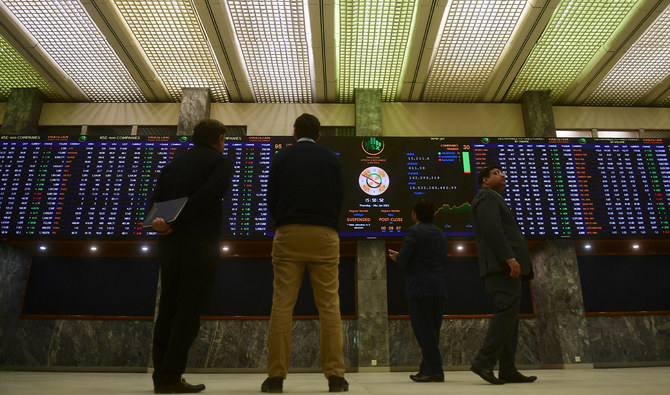
- Analysts say investors expect a significant decline in April inflation data that may lead to a cut in interest rates
- The Pakistani bourse has recently been trading at record highs due to hopes of positive loan talks with the IMF
ISLAMABAD: Pakistan’s benchmark share index breached the key level of 72,000 to trade at a record high of 72,414 points during intraday trade earlier on Wednesday, according to data from the Pakistan Stock Exchange website.
The Pakistani bourse has recently been trading at record highs amid positive sentiment prevailing among investors due to hopes of the country’s successful talks with the International Monetary Fund (IMF) for a new loan program.
The country’s finance minister, Muhammad Aurangzeb, recently visited Washington to hold talks with IMF officials for a long-term bailout facility as Pakistan’s current $3 billion program is due to expire this month.
The finance minister expressed hopes the outline of the new program would soon become visible, adding that the loan would help Pakistan continue with structural economic reforms.
“After a record current account surplus, investors are now expecting a big fall in April inflation data that may result in a cut in interest rates in the coming months,” Sohail Mohammed, CEO of Karachi-based brokerage company Topline Securities, told Reuters.
Pakistan’s benchmark KSE100 index has surged 75.5 percent over the past year and is up 11.5 percent year-to-date.
The equity market is expected to surge further as an IMF delegation arrives in Pakistan next month to determine the contours of the new loan facility.
“We are still hoping that we can get into a staff-level agreement [with the IMF] by the time June is done or early July so that we can move on,” the finance minister said on Tuesday while addressing a news conference in Islamabad.
With input from Reuters
Saudi Arabia’s non-oil exports surge by 4.4%: GASTAT
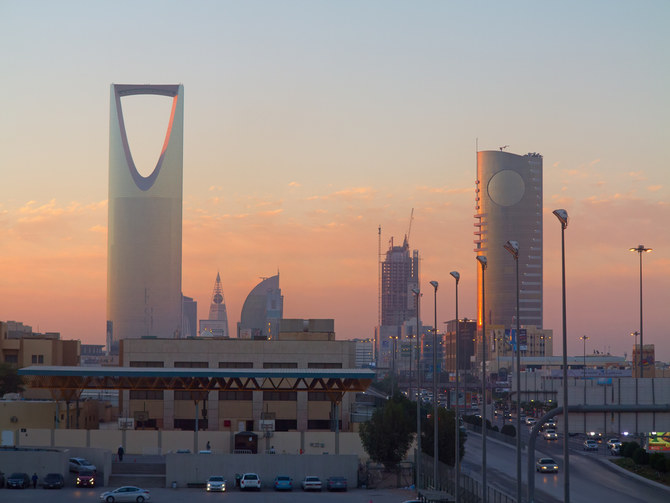
RIYADH: Saudi Arabia’s non-oil exports, including re-exports, saw a surge of 4.4 percent in February compared to the same period of 2023, official data showed.
According to the General Authority for Statistics, the total value of this sector reached SR21.86 billion ($5.83 billion), marking a rise from SR20.93 billion in the same period of the previous year.
The increase in non-oil shipments was driven by an 8.3 percent surge in the exports of rubber and plastic products in February, constituting 24.1 percent of the total exports.
Strengthening the non-oil private sector remains pivotal for Saudi Arabia, as the Kingdom continues its economic diversification efforts aimed at reducing reliance on oil.
The report unveiled a 4.1 percent year-on-year decrease in the Kingdom’s non-oil exports, excluding re-exports, in February. Conversely, the value of re-exported goods surged by 32.3 percent during the same period.
However, GASTAT noted that Saudi Arabia’s overall merchandise shipments decreased by 2 percent in February compared to the year-ago period.
This decline was primarily attributed to a 3.8 percent decrease in oil exports in February compared to the same month in 2023, according to the report.
Similarly, the percentage of oil shipments out of total exports decreased to 77 percent in February from 78.4 percent in the same period of the previous year.
The fall in oil exports was due to the Kingdom’s decision to reduce crude output, aligned with an agreement by the Organization of the Petroleum Exporting Countries, and its allies, collectively known as OPEC+.
In April 2023, Saudi Arabia reduced oil output by 500,000 barrels per day, a decision the Energy Ministry has now extended until the end of December 2024.
Compared to January 2024, the value of overall merchandise exports witnessed a marginal rise of 0.1 percent to SR95.02 billion.
GASTAT revealed that Saudi Arabia’s imports rose by 12.3 percent year on year in February.
On the other hand, the merchandise trade balance surplus decreased by 21.8 percent compared to the year-ago period.
China was Saudi Arabia’s primary trading partner in February, with exports to the Asian country amounting to SR12.57 billion.
India and Japan followed, with SR9.43 billion and SR8.55 billion in exports, respectively.
South Korea, the UAE, and Poland were also featured among the top destinations for Saudi exports, along with Egypt, the US and France.
China also held the top spot on the import side, accounting for 19.9 percent – or SR12.58 billion – of exchanges in February.
According to the report, King Abdulaziz Sea Port in Dammam was ranked the highest entry point for goods into Saudi Arabia, constituting 26.7 percent of the overall exports.
UBS gets green light to open Saudi branch for banking operations
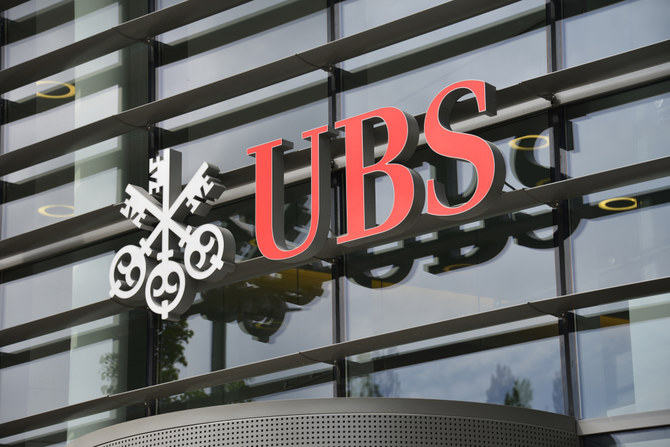
RIYADH: In a move aimed at enhancing Saudi Arabia’s financial landscape, the Kingdom has granted permission for a branch of the Swiss bank UBS to operate within the nation.
According to the Saudi Press Agency, the approval was granted during a session chaired by the Custodian of the Two Holy Mosques, King Salman bin Abdulaziz Al-Saud, held by the Cabinet in Jeddah on April 23.
The session commenced with King Salman briefing the Cabinet on the recent communications and discussions held between the Kingdom and several countries regarding shared relations, regional issues, and global developments, as reported by SPA.
In this context, the Cabinet reaffirmed Saudi Arabia’s steadfast stance toward promoting security and stability in the region and the world.
The Minister of Media, Salman bin Yousef Al-Dossary, stated in a press release following the session that the Cabinet praised the outcomes of the second ministerial meeting of the dialogue between the Gulf Cooperation Council countries and Central Asian countries.
He emphasized the Kingdom’s commitment to continue strengthening communication channels with various countries worldwide and supporting areas of joint coordination, including multilateral efforts.
Additionally, the Cabinet expressed its appreciation for the participants of the forthcoming World Economic Forum special meeting, set to take place in Riyadh in the upcoming week, highlighting the Kingdom’s dedication to encouraging global collaboration and tackling shared challenges.
Moreover, the Cabinet announced that the World Bank had selected Saudi Arabia as a center for knowledge dissemination to promote worldwide awareness of economic reforms, underscoring its leadership in achieving significant progress in global competitiveness indicators.
Al-Dossary further highlighted that the Cabinet applauded the achievement of five Saudi cities in obtaining advanced positions in the 2024 Smart Cities Index.
Following today’s session, the Cabinet approved cooperation agreements with Qatar, the Dominican Republic and the UK as well as Turkey, Chad, Portugal, Hong Kong, and Yemen.
Additionally, the body authorized discussions regarding statistical collaboration with Australia and maritime cooperation with Egypt. It also endorsed anti-corruption agreements with South Korea, archival partnerships with Greece, and financial technology collaboration with Singapore.
Authorization was granted for negotiations on science and technology cooperation with the Bahamas. A unified law for international road transport within GCC countries was approved, and additional compensation was granted to Tabah village’s affected families in the Hail region.
Furthermore, final accounts for various government entities were approved.
UAE and Oman establish $35bn investment partnerships across multiple sectors
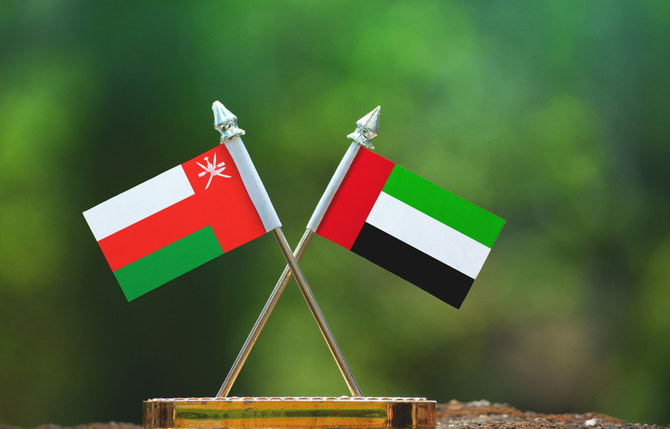
RIYADH: Trade and economic ties between the UAE and Oman are set to further strengthen thanks to the signing of investment deals worth 129 billion dirhams ($35.12 billion).
According to a press statement, these agreements cover multiple sectors, including renewable energy, green metals, railway, digital infrastructure, and technology investments.
Economic ties between the UAE and Oman have remained robust in recent years, with non-oil trade volumes reaching approximately 50 billion dirhams in 2023.
“The UAE and Oman have strong historical relations that are founded on shared values, goals and principles. The agreements represent a major milestone in our bilateral ties, as they pave the way for us to leverage our collective strength to realize our shared vision of advancement and prosperity,” said Mohamed Hassan Al-Suwaidi, UAE’s minister of investment.
One of the major agreements signed by both countries was an industrial and energy megaproject valued at 117 billion dirhams. This project encompasses renewable energy initiatives, including solar and wind projects, alongside green metals production facilities.
The deal’s signatories included Abu Dhabi National Energy Co., Abu Dhabi Future Energy Co., and Emirates Global Aluminium, as well as Emirates Steel Arkan, OQ Alternative Energy, and Oman Electricity Transmission Co.
Another agreement, valued at 660 million dirhams, was signed between Abu Dhabi Developmental Holding Co. and Oman Investment Authority to establish a technology-focused fund.
A UAE-Oman rail connectivity project, valued at 11 billion dirhams, was also inked by both countries.
Additionally, UAE’s Ministry of Investment and the Ministry of Commerce and Trade signed another deal with Oman’s Ministry of Investment Promotion to cooperate in multiple sectors, including digital infrastructure, food security, and energy.
Etihad Rail, Mubadala, and Omani Asyad Group Co. signed a shareholding partnership valued at 3 billion dirhams.
Both countries also announced the formation of a UAE-Oman alliance to enhance bilateral economic and trade relations.
The UAE’s Ministry of Investment, in the press statement, further noted that the signing of these agreements will serve to bolster relations across key sectors and foster socio-economic benefits, contributing toward a stable and prosperous future for both countries.


